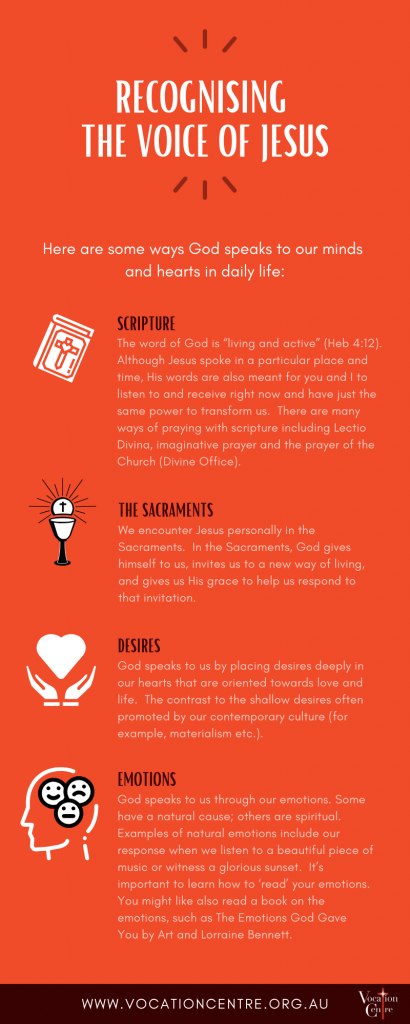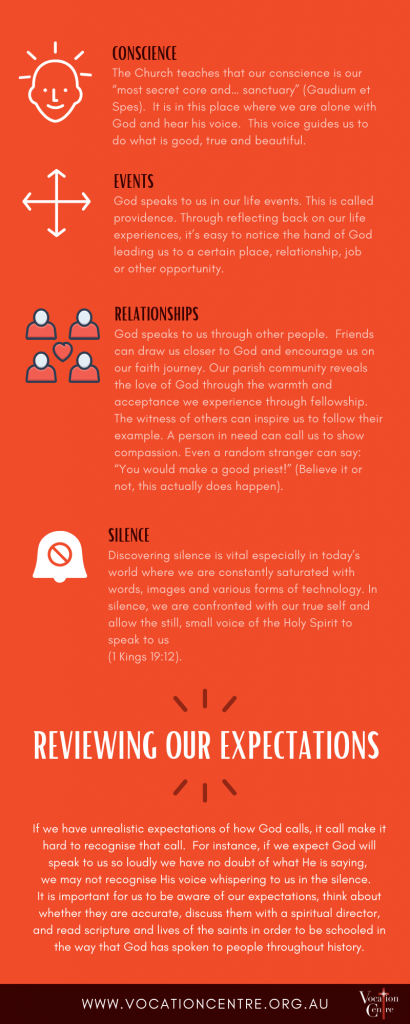Recognising the Voice of Jesus
“The voice of Jesus is unique! If we learn to distinguish it, He guides us on the path of life”, Pope Francis tells us. The question is: how do we learn to recognise the voice of Jesus calling to us? Here are some ways God speaks to our minds and hearts in daily life:
The word of God is “living and active” (Heb 4:12). Although Jesus spoke in a particular place and time, His words are also meant for you and I to listen to and receive right now and have just the same power to transform us. There are many ways of praying with scripture including Lectio Divina, imaginative prayer and the prayer of the Church (Divine Office).
Download Infographic


We encounter Jesus personally in the Sacraments. In the Sacraments, God gives himself to us, invites us to a new way of living, and gives us His grace to help us respond to that invitation.
God speaks to us by placing desires deeply in our hearts that are oriented towards love and life. The contrast to the shallow desires often promoted by our contemporary culture (for example, materialism etc.).
God speaks to us through our emotions. Some have a natural cause; others are spiritual. Examples of natural emotions include our response when we listen to a beautiful piece of music or witness a glorious sunset. It’s important to learn how to ‘read’ your emotions. Click here for some tips. You might like also read a book on the emotions, such as The Emotions God Gave You by Art and Lorraine Bennett.
The Church teaches that our conscience is our “most secret core and… sanctuary” (Gaudium et Spes). It is in this place where we are alone with God and hear his voice. This voice guides us to do what is good, true and beautiful.
God speaks to us in our life events. This is called providence. Through reflecting back on our life experiences, it’s easy to notice the hand of God leading us to a certain place, relationship, job or other opportunity. To read more about God’s providence, click here.
God speaks to us through other people. Friends can draw us closer to God and encourage us on our faith journey. Our parish community reveals the love of God through the warmth and acceptance we experience through fellowship. The witness of others can inspire us to follow their example. A person in need can call us to show compassion. Even a random stranger can say: “You would make a good priest!” (Believe it or not, this actually does happen).
Discovering silence is vital especially in today’s world where we are constantly saturated with words, images and various forms of technology. In silence, we are confronted with our true self and allow the still, small voice of the Holy Spirit to speak to us (1 Kings 19:12).
Reviewing Our Expectations
If we have unrealistic expectations of how God calls, it call make it hard to recognise that call. For instance, if we expect God will speak to us so loudly we have no doubt of what He is saying, we may not recognise His voice whispering to us in the silence. It is important for us to be aware of our expectations, think about whether they are accurate, discuss them with a spiritual director, and read scripture and lives of the saints in order to be schooled in the way that God has spoken to people throughout history.
God Calls Sinners
How could God be calling me? I’m not really a good person. If feel you are not holy enough to be called by God, you have Pope Francis to keep you company! In one interview Pope Francis answered the question “who are you?” with “I am a sinner.” Jesus himself said “I did not come to call the virtuous, but sinners” (Mk 2:17). St Augustine’s favourite image of the Church is that of a hospital. The Church is for sinners, where we meet God who heals us and transforms us to be saints.

